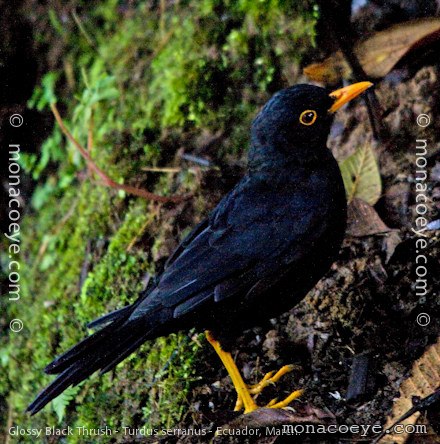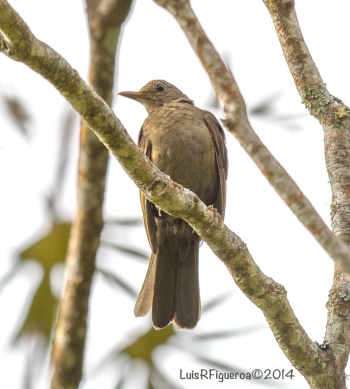(Basic tidy-up. Behaviour expanded. References updated) |
(Picture of female. References updated) |
||
| Line 4: | Line 4: | ||
==Identification== | ==Identification== | ||
| − | 23–25 cm<br /> | + | 23–25 cm (9-10 in)<br /> |
The '''male''' is deep glossy black with distinct orange legs, bill and yellow-orange eye-ring (eye-ring color is more variable than some books give impression of). | The '''male''' is deep glossy black with distinct orange legs, bill and yellow-orange eye-ring (eye-ring color is more variable than some books give impression of). | ||
Identification of the dark brownish '''female''' can be more difficult, but the plain/faintly streaked throat and the narrow indistinct yellowish eye-ring are often useful. | Identification of the dark brownish '''female''' can be more difficult, but the plain/faintly streaked throat and the narrow indistinct yellowish eye-ring are often useful. | ||
====Variations==== | ====Variations==== | ||
| + | [[Image:Hembra Paraulata Ciote 2 copy 01.JPG|thumb|350px|right|Female<br />Photo by {{user|Luis+R|Luis R}}<br />[[El Avila National Park]], Metropolitan Region, Caracas, [[Venezuela]], May 2014]] | ||
Males of the subspecies ''cumanensis'' (with relatively small distribution) are duller than the remaining subspecies. | Males of the subspecies ''cumanensis'' (with relatively small distribution) are duller than the remaining subspecies. | ||
====Similar Species==== | ====Similar Species==== | ||
| Line 34: | Line 35: | ||
They mostly eat fruit and berries. | They mostly eat fruit and berries. | ||
==References== | ==References== | ||
| − | #{{Ref- | + | #{{Ref-Clements6thAug14}}# BF member personal observation |
#[http://www.birdforum.net/showthread.php?t=238828 Birdforum thread] discussing id of this species | #[http://www.birdforum.net/showthread.php?t=238828 Birdforum thread] discussing id of this species | ||
#Handbook of the Birds of the World Alive (retrieved April 2014) | #Handbook of the Birds of the World Alive (retrieved April 2014) | ||
Latest revision as of 22:20, 23 July 2015
- Turdus serranus
Identification
23–25 cm (9-10 in)
The male is deep glossy black with distinct orange legs, bill and yellow-orange eye-ring (eye-ring color is more variable than some books give impression of).
Identification of the dark brownish female can be more difficult, but the plain/faintly streaked throat and the narrow indistinct yellowish eye-ring are often useful.
Variations
Males of the subspecies cumanensis (with relatively small distribution) are duller than the remaining subspecies.
Similar Species
The male resembles several other black thrushes in South America, especially Great, Chiguanco and Pale-eyed Thrush. The last easily separated by its pale eyes. First two can be harder, but neither is as deep glossy black as the Glossy-black Thrush.
Distribution
South America: found in Venezuela, Colombia, Ecuador, Peru, Bolivia, Argentina
Taxonomy
Subspecies
There are 5 subspecies[1]:
- T. s. cumanensis:
- North-eastern Venezuela (Anzoátegui, Sucre and Monagas)
- T. s. atrosericeus:
- T. s. fuscobrunneus:
- T. s. serranus:
- T. s. continoi:
- North-western Argentina (Salta and Jujuy)
Habitat
Montane forest, almost exclusively humid.
Behaviour
Arboreal and often rather secretive.
Diet
They mostly eat fruit and berries.
References
- Clements, J. F., T. S. Schulenberg, M. J. Iliff, D. Roberson, T. A. Fredericks, B. L. Sullivan, and C. L. Wood. 2014. The eBird/Clements checklist of birds of the world: Version 6.9., with updates to August 2014. Downloaded from http://www.birds.cornell.edu/clementschecklist/download/
- BF member personal observation
- Birdforum thread discussing id of this species
- Handbook of the Birds of the World Alive (retrieved April 2014)
Recommended Citation
- BirdForum Opus contributors. (2024) Glossy-black Thrush. In: BirdForum, the forum for wild birds and birding. Retrieved 20 April 2024 from https://www.birdforum.net/opus/Glossy-black_Thrush





